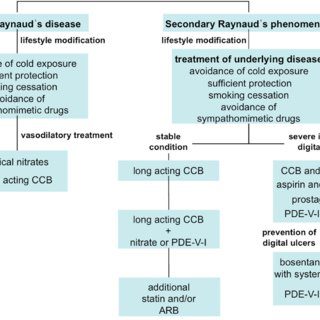Werrej
Medical treatments for Raynaud’s disease
There is as yet no definitive treatment to cure Il-marda ta 'Raynaud (primary form). However, it is possible to decrease the frequency of seizures by changing certain habits, such as tieqaf tpejjipx ou protect yourself from the cold.
In addition, the symptoms should never be overlooked since they can hide another problem or be the first symptom of an underlying disease such as rheumatoid arthritis or scleroderma. It could then be that we are in the presence of the Sindromu ta 'Raynaud (secondary form). In this case, the treatment will aim to cure the underlying disease, which requires a medical consultation.
Medical treatments for Raynaud’s disease: understand everything in 2 minutes
What to do in the event of a crisis?
Get warm is the first thing to do, in order to calm the spasm of the blood vessels.
- Lil saħħan hands or feet, as the case may be:
place them under the armpits,
soak them inilma fietel (not hot) or run lukewarm water over them.
- Lil restore circulation :
jimxu fingers or toes,
massaġġi the affected parts,
move your arms while doing large circles.
Meta l- istress is at the origin of the crisis, to go to a post kwiet and, while warming the affected areas, use an anti-stress technique. Or, get out of the stressful situation, with the help of a third party if necessary, in order to relax.
farmaċewtiċi
Nies bi marda de Raynaud’s rarely need medication. However, these become necessary in case of severe Raynaud’s syndrome.
Vasodilataturi. These drugs promote irrigation of the extremities by increasing the opening of the blood vessels.
- Imblokkaturi tal-kanali tal-kalċju. These drugs (pinaverium, nifedipine, buflomedil, nimodipine, etc.) have the effect of jirrilassaw il-muskoli u, dilate small blood vessels. They are usually prescribed to treat certain heart conditions and high blood pressure. Calcium channel blockers provide relief for two thirds of patients with Raynaud’s disease (primary or secondary). They also help in the healing of skin ulcers on the fingers and toes.
- Imblokkaturi alfa. These drugs (prazosin, doxasosin, etc.) provide relief in some patients by counteracting the action of norepinephrine, a hormone that is involved in the narrowing of blood vessels. They are also used to treat high blood pressure. Their effect on Raynaud’s syndrome is modest; a more specific alpha blocker is currently under study.
- La nitrogliċerina fil-forma ta ' krema is also sometimes used for this purpose.
- Le sildenafil (Viagra®). This phosphodiesterase type 5 (IPDE-5) inhibitor, mainly used to treat erectile dysfunction, may reduce the frequency of seizures. It is reserved for patients for whom other vasodilator treatments are ineffective.
Adjuvant treatment. When a patient does not respond to treatment, the doctor may prescribe other drugs that increase the effect of vasodilators.
- Fluoxetine (antidepressant)
- Le cilostazol
- Pentoxifillin
Noti. The various treatments recommended are not always effective, in particular to treat Sindromu ta 'Raynaud. Some people are more sensitive to side effects and do not tolerate treatment well.
In the most serious cases
When the blood circulation is imblukkata and that there is a risk of gangrena, Il- l-isptar may be necessary. This allows for closer clinical monitoring and, if necessary, the administration of more potent vasodilator medication intravenously. In advanced gangrene, a amputazzjoni jista’ jsir meħtieġ.










